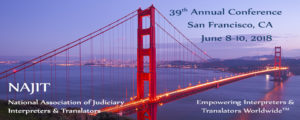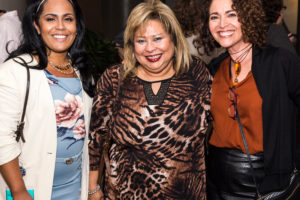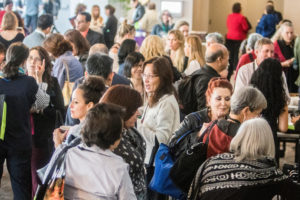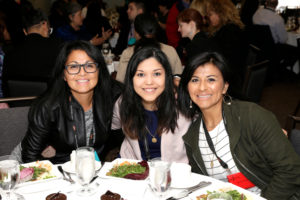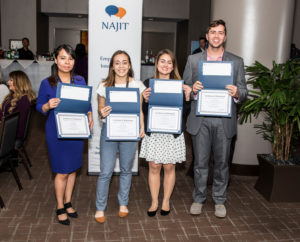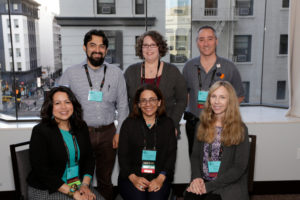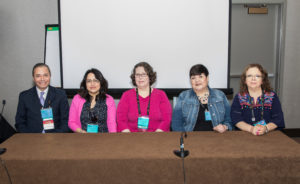Letter from the Editor: Proteus 2018 Summer Volume XXXI Issue No 1

Proteus
Issue: 2018 Summer Volume XXXI Issue No 1Table of Contents
Editor's Corner
Letter from the Editor Summer 2018
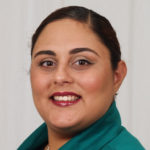
By Arianna M. Aguilar
It is hot, isn’t it? Why don’t you take a break from the summer heat to read the most current issue of Proteus.
Many of you attended the NAJIT conference in June in San Francisco, CA. In this issue, we have a roundup of the conference with highlights and statements from this year’s scholars.
Also, José Navarette wrote a piece about how doing outreach in schools has brought him satisfaction and brought him back from the brink of despair related to issues in the interpreting profession.
And Rafa Lombardino asks us the question, “What is your best rate?” She discusses what factors go into calculating your rates.
Regular contributor Hal Sillers contributed a “punny” poem about the English language.
We also have an interview with Dr. Dave Gilbert, who started his educational and career journey because of inspiration from NAJIT.
Just as Dr. Gilbert, members can take advantage of what NAJIT offers, including educational opportunities at the Annual Conference, NAJIT’s blog, and Proteus. In order to have these benefits, it is important to have member participation.
So, if you are interested in contributing to something for Proteus or wish to be involved in the editorial or proofreading process, please contact the editorial staff.
Have a great summer, and don’t forget your sunscreen!
Warm regards,
Arianna M. Aguilar
Meet the Editors
Editors of Proteus 2017/18 Winter Volume XXX Issue No 2

Arianna M. Aguilar has a degree in communications and has been interpreting and translating since 1999. She has been a certified court interpreter in North Carolina since 2005, and master certified Spanish-language court interpreter since 2013. She is president of Latino Outreach Consulting of NC, Inc., a translation and consulting agency, and is a published author. She has given presentations on a range of topics at both NAJIT and American Translators Association (ATA) conferences.

Andre Moskowitz is a Spanish-language interpreter certified by the United States federal courts and the California state courts. He is also a Hispanist, lexicographer and dialectologist, who has published a series of works in the areas of Spanish lexical dialectology and Spanish lexicography.He taught English in Colombia and Ecuador for four years, and holds a B.A. in humanities from Johns Hopkins University (1984), an M.A. in translation studies from the City University of New York Graduate Center (1988), and a second M.A. in Spanish with a minor in Portuguese from the University of Florida (1995). He is certified by the American Translators Association as a Portuguese>English, Spanish>English and English>Spanish translator. He is also an editor for Intercambios, the newsletter of the Spanish Language Division of the American Translators Association (ATA).
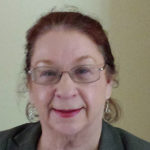
Kathleen Shelly a Delaware and Maryland translator and interpreter certified by the Consortium for Language Access in the Courts, has worked as a professional interpreter and translator for the past 18 years. She has a master’s degree plus doctoral work in Latin American literature from the Ohio State University, and was a college professor for 12 years. A member of NAJIT since 2005, she has served as Secretary of the Board of Directors and a co-editor of Proteus,and always welcomes the opportunity to work to promote the interpreting profession. She is also a member of ATA and Delaware Valley Translators Association.
Feature Articles
Is There Such a Thing as a “Best Rate” in the Translation Industry?

By Rafa Lombardino
Have you ever received an email from a client asking for your resume and your “best rate”? Do you have a number you would consider a “best rate”? Is there, in fact, such a thing?
Most requests I receive from potential clients, as well as the job posts I see online, mention this mysterious unit of measure. I usually reply with my standard rate, but whenever the client’s Project Manager emphasizes “best,” I tell them that it’s $1 per word. Wouldn’t it be wonderful if all of us could make a whole dollar per word? That would literally be the best!
Jokes aside, we all know that’s not what these clients are asking for, is it? They want to know our lowest price, that is, what’s best for them.
We cannot fall into such a trap! If we all start to lower our prices just to secure a project, in some sort of upside-down auction, it may be harder to bring our prices back the standard rate once a business relationship is established. It’s not a matter of “how low can you go”―it’s a matter of how competent you are in providing the services a client needs.
If we all start to lower our prices just to secure a project, in some sort of upside-down auction, it may be harder to bring our prices back the standard rate once a business relationship is established.
In order to thwart this strategy by translation agencies, keep an eye on your average output, calculate the income that you can expect based on your working hours per week or month, and try to find the range of rates that work.
It’s okay to have a range, to charge more or less depending on the nature of the project, since some subjects may come easier to you than others. And it’s okay to be sensitive to a client’s geographic location, currency, payment method, and other particular details, as there are several factors that need to be taken into account when working with international clients. What payment methods are available to clients located in another country? What’s the currency conversion rate, and how does that affect the final amount you’ll receive after transfer and bank fees are deducted? Does the client need more time to make payment than you’re used to wait in order to be paid for your work?
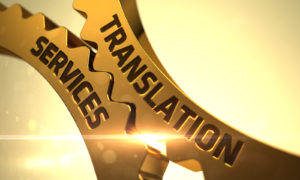
It’s also okay to offer a range of prices: one that is higher for more urgent documents, which would keep you booked and fully dedicated to that client until the delivery date, and another one that is lower, thus more beneficial to the client, but which would give you more time to complete the project and, consequently, give you the ability to add other projects to the schedule, thus removing the idea of exclusive dedication. Odds are, clients will potentially choose the latter and you’ll be able to organize yourself better.
Deep down, it’s all about client education. Translators should make their best efforts to try to get the client to understand that going for the cheaper alternative may not be the smartest decision they’ll be making for the sake of their business. All in all, they may end up paying twice as much for a not-so-good translation AND a separate copy editor to fix everything, compared to what they would be paying for a qualified translator who charges a fair price for the quality and turnaround being offered.
Notwithstanding your negotiation strategy, you must always keep one thing in mind: In the end, you have bills to pay and must make a living, just like everybody else. Your knowledge, your skills, and your time go into your price.
So, what’s the “best rate” for you?
[Rafa Lombardino is a translator and journalist from Brazil who lives in California. She is the author of “Tools and Technology in Translation ― The Profile of Beginning Language Professionals in the Digital Age,” which is based on her UCSD Extension class. Rafa has been working as a translator since 1997 and, in 2011, started to join forces with self-published authors to translate their work into Portuguese and English. In addition to acting as content curator at eWordNews, a collective blog about translation and literature, she also runs Word Awareness, a small network of professional translators, coordinates Contemporary Brazilian Short Stories (CBSS), a project to promote Brazilian literature worldwide, and is the current American Translators Association – Portuguese Language Division (ATA-PLD) Administrator for the 2017-2019 term.]
The views and opinions expressed are those of the author and do not necessarily reflect the official position of NAJIT.
A Public Servant Finds His Way from Despair to Hope to Promise
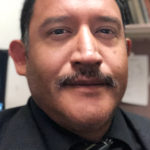
By José A. Navarrete
I am a full-time Spanish/English staff court interpreter/translator at the Santa Barbara Superior Court on California’s central coast performing linguistic tasks daily for criminal/civil judges, attorneys, court staff and the community at large. After a successful start as an independent contractor in the counties of Los Angeles and Orange, I made the decision over 14 years ago to move 100 miles north and accept permanent employment in this rural county in California’s state court system. The year was 2004. The state legislature had recently passed a law that for the first time gave judicial interpreters the option to become employees. Whether or not the system was ready for us, or whether we were ready for the system, is still being determined; so far, it has been a bumpy ride. Although I am happy to report that, despite the many challenges that professional court interpreters still face today, there is some light at the end of this dark tunnel—namely, the glimmer of hope that can be seen in future generations of judiciary language professionals. Please allow me to tell you about the outreach we have accomplished at local schools in Santa Barbara County in an effort to introduce the community to the value of professional language access and to encourage bilingual schoolchildren and teens to consider a career as an interpreter/translator.
EARLY RUMBLINGS AND SEISMIC WRATH
This story, however, starts off in a very negative place some 10 years ago. It was one thing to be an autonomous operator, running the streets of LA not beholden exclusively to any employer, and quite another to be directly overseen by a system that hardly understands or appreciates the nature of your work. Having grown up during the turbulent 70s/80s in LA on a steady diet of hardcore punk and hip-hop (both in their nascent stages, no less), it’s never been difficult to readily find myself frustrated, angry or bitter with the state of the world or, now, with my chosen career. Because of this, I was programmed to often find myself misunderstood, to find all the injustices in life, then allow the fury to overwhelm me and rebel against the world with scorching defiance. Now, court interpreting is a career that is frequently misunderstood. Many wouldn’t even know it actually exists, unless they find themselves in court and see an interpreter in action. Even after seeing an interpreter at work, some might not think of it as a career at all, but rather just a simple task that anyone can come in to perform when the need arises. As the late Rodney Dangerfield might say, I dress up in a suit and tie every day of the week, but I get no respect. Our regional union of judiciary interpreters had just come back to work after an unsuccessful strike, which all but confirmed what I already felt: as professionals, we get almost no respect from our own employers, and/or the public.
As if that weren’t bad enough, it turned out that society at large didn’t think too much of us either. After about six years on staff, I had already realized that we live in a town, and actually in a state and nation, where many think that they have a certain command of the Spanish language. This pervasive hubris has eroded the language itself and our profession. I do not mean to suggest that people shouldn’t try to learn and practice this beautiful, complex language, but when it comes to providing service in Spanish, I expected people to be more responsible. I never correct people during casual conversation, because it’s not my place; people learn and speak in their own style, at their own pace. I’m not a language instructor or purist. I do, nevertheless, take issue with those who insist on making themselves out to be bilingual professionals, when they clearly don’t possess the skills. And yes, I lashed out hard, made several enemies and rubbed certain folks the wrong way with direct confrontation. It was just outrageous to me that every type of federal, state, county and city agency has staff, and written material, that employ deficient to mediocre Spanish to communicate with the vast majority of monolingual Latinos that make up the populace. I let them all know exactly how I felt, as many as I could, and definitely got into big trouble because of it. As a result, I was almost fired at least twice.
My outrage led me to call out these “bilingual” individuals: Chicanos, Latinos and Hispanics that grew up speaking and practicing limited Spanish in a monolingual household, or non-Latinos that had marginally studied the language. You communicate well enough with your gardener and housekeeper, and you can order a taco, so of course you know Spanish, right? And, most U.S. Chicanos and other, even native or foreign Latinos grew up speaking Spanish at home (then neglect their study of Spanish, and awkwardly assimilate to English), so of course they’re fluent enough to translate, right? Wrong! I thought about my own childhood, growing up with parents who were looked down upon by both white people and whitewashed Hispanics for barely speaking English. The fact that the articulate Spanish that did speak went unappreciated made the flames of my rage only grow, fanned by the bellows of this collective ignorance and subtle form of racism.
I began to blame some senior court interpreters, who had been operating in this town and state for several years, for producing and perpetuating sub-standard work, and over-charging for the same. I argued that they didn’t realize that our standards have improved, or that they simply refused to work up to those higher standards.
This includes the legions (a whole swath of society that outnumbers us certified interpreters/translators) of “bilingual” attorneys, clerks, secretaries, peace officers, advocates, paralegals, receptionists, community activists, politicians, program directors, administrators, facilitators, counselors, doctors, nurses, notaries, mediators, case managers, or just people in general who insist on using their rudimentary Spanish and/or English, volunteer or charge money, and act like interpreters and translators all over the place, just winging it with choppy, simplified verbiage, when they clearly lack any training or even true, academic preparation in the Spanish language. They insist on using their inadequate Spanish and English to interpret or translate, without bothering to accept the preparatory rigors of the language profession. Aside from terminology (which is huge), their incompetence and lack of sophistication is also apparent in the poor syntax employed in their texts and speech. The message comes across as unnatural and, ultimately, unprofessional. I was not shy about deriding their commonly specious and disingenuous arguments: “the commoners won’t understand the ‘big words,” or, “it’s important to use ‘plain language’ so that people understand.”
In my experience, monolingual Spanish-speakers actually understand proper terminology 95% of the time, and they DO appreciate it when I use the language correctly. Supposedly bilingual people should not attempt to assess a person’s full knowledge and culture based on his or her perceived working-class appearance or educational background. It is wrong to simply assume that a person is illiterate and then and use this deficient assessment as an excuse to dumb down the language (culture, ultimately) for one’s own convenience or to avoid displaying one’s incompetence? I saw this kind of behavior as dishonest, offensive and downright lazy, and did not hesitate to say so..
These were the queries and exasperations that swirled around in my head, and it didn’t take me long to realize how much this boiling poison was literally killing me inside. I was angry at the world, and I wanted to tear it all down with ferocity. I was losing hope. I was becoming self-destructive. Is the world truly this awful? How do I avoid tearing myself apart for picking a career that has devolved? Is it naïve to believe that there can still be hope? What can I do to turn this dark energy into something more productive?
A GLEAM OF HOPE
Prompted by a sudden inspiration to perform actions and develop ideas, as opposed to a reactive analysis and forcefully adhering to beliefs, I began to research volunteer opportunities in Santa Barbara, and found out that the local County Education Office was running a program called Partners in Education. In the mid-2000s there had been a nasty spate of sometimes fatal teenage stabbings in the area, and local educators and community/business leaders were scrambling to find ways to reach out to local youth, trying to show them a way out of the violence, to shake off their demons and think about a bright future. Partners in Education recruited professionals from every possible field and organized Career Days at middle schools, as this was the grade/age level that seemed to be most at-risk—young enough to be impressionable and old enough to understand how to begin making life decisions. There were bigger things happening, and I just needed to look up, above and beyond my dark cloud, and find a purpose.

Your hopeful narrator signed up and got promptly tested for tuberculosis and background-checked. Why not? I always wanted to be a teacher of sorts, probably the noblest profession of them all. If society, my employer and some of my fellow interpreters were not willing to understand what my career has to offer, then perhaps it was up to me to reach out and educate others through any forum I could. I asked for vacation time at work, and to my immense surprise, the executive director, my supervisor at the courthouse, decided I needn’t use my personal time to attend: I would be participating in these Career Days on the clock, officially representing the Court. (Unbeknownst to me, perhaps someone at work was paying attention to my craft and passion…? Do positive things come to light when you begin changing your perception for the better?) I was quite surprised, and felt further compelled to take this new responsibility very seriously. Every school year since then, Partners in Education sends me the list of Career Days at all the middle schools in the district, sometimes as far as Lompoc, Santa Maria and the Santa Ynez Valley; I let my awesome coordinator at the court know, and she schedules them around my regular court assignments. They always take place only in the morning, so I only have to be away from my duties for half a day.
PREPARING TO REACH OUT
The day before each presentation, I make copies of all my handouts: False Friends/Cognates, a list of examples; Court Terminology, a sample list of terms and their respective translations; and Animal Sounds, a list of some animals in Spanish, their translation into English, and their different sounds, using the simple present tense. I pack my file of transcripts of a real court case for some role-play. I also take a bunch of books to give the students a sense of the language resources I have used to prepare myself for the work on interpreting: my old Larousse Spanish dictionary, my old Larousse English/Spanish-Spanish/English dictionary; the seminal textbook Fundamentals of Court Interpretation authored by Dueñas-González, Vásquez and Mikkelson; a Spanish thesaurus; a Spanish grammar and orthography textbook; Sandro Tomasi’s Glossary of Criminal Law Terms; as well as a number of laws, codes and constitutions I have collected over the years. I pack everything into a big old, fat brief case that was bequeathed to me by this sweet and wacky Colombian lady I used to interpret for years ago at a clinic, whose late Jewish husband had been an accountant and used this dark cherry leather box during his career. It gets heavy with all my materials in it, but I don’t mind. It’s the kind of baggage that actually feels good to carry around for a change.
BUENOS DÍAS / GOOD MORNING
When I get to the school, we are given a name badge and a small map of the school so we can navigate the way to our assigned classrooms. Sometimes we’re in the same room for all three periods. We start off the morning in the library, cafeteria or teachers’ lounge where we are treated to some kind of continental breakfast, mixing and mingling with the other professionals: lawyers, doctors, nurses, firefighters, police officers, financial planners, airplane pilots, college professors, dentists, entomologists, hairdressers, movie producers, among many others. My involvement at these Career Days has allowed me to inform these other professionals about the court interpreter’s role and importance in society. I was pleasantly surprised to learn that while most of them knew very little about what I do, many of them seemed intrigued and genuinely curious about my calling.
I’ll inform them that the work of the interpreter/ translator is a whole lifetime of working for oneself, as it is truly our job as perpetual students to continue expanding our bi-terminology and bi-literacy, while perfecting our voice and technique.
SOY INTÉRPRETE JUDICIAL / I’M A COURT INTERPRETER
Next we are all escorted off to our assigned classrooms, where 20-30 pupils await to hear our stories. With a smile, I begin by introducing myself to the group of young learners, explaining what I do at the courthouse in a nutshell: interpret/translate one language into another for the benefit of the court, staff, parties and counsel in all cases that involve a Spanish speaker who speaks limited English. Then I preface the bulk of my presentation by stating how happy I am to be there with them, in essence, because I stand before future leaders; I ask if they agree, scanning the room, eliciting nods and utterances of approval. Then I ask, “Who can tell me, in a few words, what a leader is”? A few of them volunteer and say things like, “someone who leads,” “someone who guides others,” “someone who takes charge,” etc. I praise all their suggestions, and then tell them how, long ago, one of my best friends gave me a succinct definition of a leader: A leader is the one who does the work. I tell them how life—which can be fun and delightful—is mainly about hard work, and at some point in their lives, they’ll have to decide whether they will work for themselves or for someone else. I tell them how their current “job” as middle school students has the word ‘work’ in it: homeWORK. As adults, we continue using this metaphor to speak of how prepared we are for a given task: “Have you done your homework?” before a sales pitch or a debate or something. I remind them how all the professionals they’ll meet that day have worked hard to be where they are, including their own teacher in the classroom. I’ll inform them that the work of the interpreter/translator is a whole lifetime of working for oneself, as it is truly our job as perpetual students to continue expanding our bi-terminology and bi-literacy, while perfecting our voice and technique.
I then explain the process of looking for words/definitions/translations in dictionaries and glossaries, and our own development of specialized lexicons and sub-glossaries. But to really get things going, I give them examples of the modalities. For consecutive, I ask for random volunteers among them to tell me their names and what they want to be when they grow up. I walk up to them as some of them have soft voices, and I just listen. When they’re done with their exposition, I render their statement into Spanish for the class to hear. Some of the cleverer students will say it in Spanish and reverse it on me. The classmates get a kick out of hearing their peers come up with careers, some earnest, some silly and outlandish, then watching me repeat it all in Spanish. Next is the simultaneous, when I use the transcript of a certified felony plea, and I ask for four volunteers to play characters in the drama of the court: the judge, the D.A., the public defender and the Spanish-speaking defendant, while I interpret their lines into Spanish out loud for all to hear. The activity is raucous and comical enough to pique the interest of schoolchildren, yet they also get a clear sense of the difficulty and complexity involved in our daily task. I explain the importance of shadowing, to exercise the mind in preparation for the demands of the simultaneous mode, and I give them an example of how to shadow. I then engage the class in a discussion/lecture on the pitfalls and complexity of false cognates, a brief sampling of court terms, profanity/slang (they always get a kick out of this part, although I keep it clean by demonstrating, through the use of euphemisms, how we many times, as interpreters/translators, have to calibrate our renditions to equate to the degree of profanity: the teachers ALWAYS appreciate that), the different specialized glossaries and sub-glossaries that we have to acquire and learn (all medical, traffic, all civil, car parts, descriptions, colors, names of crimes, names of trees, fruits, animals, types of dogs, etc.), and by way of example, a sampling of animal sounds. I ask them to look for cat/gato on the list I give them and ask them which of the listed verbs next to cat would be the Spanish translation for “(to) purr,” until one of them figures out it is ronronear. And just as the outreach and the connection with these future leaders purrs along (I could go on and on, when it comes to interpreting/translating, and I encourage and welcome questions throughout my presentation), we are interrupted by the commanding school bell, moving everyone en masse to their next classroom. And so it goes, year after year, the magic happens again, but always different: it’s an evolving, smooth-humming production line of hope and faith in successive generations.
DENOUEMENT
Every time I do these Career Days, my nervous/excited spirit does purr like a contented feline, like the hum of a well-oiled machine, like the natural rustle of leaves on a windy day…indeed a shift in attitude and perspective; less combative, more collaborative, productive. I’m learning to channel my frustrations into energy that I focus on perfecting my craft. This is what I was born to do. I am a public servant, here to provide a resource to my community. The California Courts’ Language Access Plan is being implemented as I write this narrative, and a couple of its recommendations involve implementing outreach programs with local schools and institutions to promote our profession. A couple of years ago, the Language Access Implementation Task Force Chair and California Associate Supreme Court Justice Mariano-Florentino Cuéllar visited us in Santa Barbara County and commended our many initiatives (including these Career Days and free community workshops on how to become an interpreter). While there are still some serious concerns related to the conditions of California court interpreters, not the least of which is the painful and confusing transition our current labor union is facing, it is easy to fall into that dim and ireful chasm, lash out left and right, straining to see the light. I have to maintain that good spirt, I must forever remind himself. We may only be a small corner of the state, but we’re doing our part. The following letters (out of the hundreds I have received here at the courts from middle school students over the years) are what finally make my spirit soar. My dearest colleagues in courts across the nation, we can all soar together to benefit our profession by performing similar outreach at our local schools. It can be rewarding in so many ways.
I’m learning to channel my frustrations into energy that I focus on perfecting my craft. This is what I was born to do.

THE SCHOOLCHILDREN DISPATCH THEIR WORDS OF SUPPORT, EARLY SIGNS OF AWARENESS (RETYPED WORD FOR WORD, AS IS)
Thank you translator for taking the time to speak to us about your job I really liked hearing about your career. I thought that you being able to translate so fast was so impressive. I really liked what you said about, everyone has a right to hear. I think that I’m going to put translator on my career list. I was really inspired by it all because not being able to understand a language & what is going on Feels horrible and being able to help is wonderful. Thank you so much for speaking. I didn’t even know that there was a career to translate in court. Thank you.
-Karla T.
Thank you! Thank you for coming to our school. I appreciate it. I think it is very interesting. I love your job it’s very interesting. I couldn’t do it though. I suck at Spanish. I think you should come next year even though I won’t be here. I think other people would be interested in your job! I think I would be terrified if I had to talk to the judge! From,
-Skylaa B.
Dear Jose Navarrete, Thank you for coming to La Cumbre during my Spanish class. I had to talk and you talked while I talked and it was fun. Thanks again for talking to my class, I really enjoyed it and had fun. Sincerely,
-Luis S.
February 26, 2016, Dear Jose Navarette [sic], I wanted you to thank you for taking the time to come to my school and talk about your career. It is very interesting and it seems hard, but it seems you have everything under control. Role playing was very fun, but really hard because you would be talking at the same time. Out of everyone that came yours was my favorite because your career actually caught my attention. I don’t know why, but I believe it is because I never knew that career (existed) [sic]. I really hope you come back next year so you talk to the incoming students to show how important and fascinating your job is. I really hope you keep on helping people how you help them today and I hope I become like someone like you, giving back to people the help they need. Sincerely,
-Sofia M.
2/24/17 Dear Jose, Thank you so much for coming to my school and showing your job. Today you inspired me to become a translater [sic]. I think I would be good for this job because I speak English and Spanish and with our new president many people will feel scared especially if they don’t speak the language. Thank you for giving us the false friends worksheet. Hopefully I can impress my parents with my 2 worksheets. Thank you Sincerely,
-Maria M.
Thank you Jose for showing us how fluently you can speak English and Spanish. I like your job because it’s interesting how you translate. Sincerely,
-Fabian P.
Thank you for helping all those people understand what was going on. Without you there would be a lot of struggling people in this world. You have influenced me to actually listen to my mom n’ try to learn Spanish when my family speaks it to me. I really enjoyed when we had to read what happened in that one case it was truly amazing how you were able to translate all that in another language so fast. You seem like a very nice man and I’m very lucky that I was able to meet you and learn about your impressive career. You really influenced me. Thank you so much. I hope you have an amazing rest of your life & your career. Gracias,
-Fiona C.
10/07/16 Dear Jose, Thank you for speaking in our class about your job. It was very interesting and I really enjoyed being the public defender during the simulation. I learned a lot and I hope you had fun teaching us about your job, you should do it again. See you around! Sincerely,
-Zosia A.
Dear Spanish Interpreter, Thank you for coming to our Spanish class and taking the time to put together this presentation and showing what you do. It looked really hard to do and you were doing it so easily. I also thought it was really cool how you get to go to court and listen and be a part of all the really cool cases and get to interpret it and be able to do it so easily and get paid a lot of money for it. Thank you for sharing with us and finding the time to come in. Sincerely,
-Kiani R.
10/6/16 Dear Mr. Navarred [sic] Thank you so much for coming to our school. I am very grateful that you have come to our school to teach us about your job. I really enjoyed learning about your job. Being able to talk simeaulantiously [sic] while the person while the person is talking IN A DIFFERENT LANGUAGE is super hard. It also makes me feel good inside because you do this and help people get through court in the easiest way possible. I don’t think anyone should take you for granted because your job is super important. Thank you.
-Kidus E.
[Mr. Navarrete was born and raised in Los Angeles, California, bilingual all of his life—his father from Chihuahua, México and his mother from San Salvador. He studied Spanish Literature and Literary Theory at UC Irvine. After college he worked at non-profit organizations and dabbled in the corporate world, then began his training at the Southern California School of Interpretation, under the tutelage of Néstor Wágner, becoming state court certified in 2003. During and after this training, José picked up a variety of assignments, including: Worker’s Compensation Appeals Board appearances, civil trials and hearings, depositions, transcript readings, medical appointments, physical therapy sessions, among others. After a year and a half of working independently, he finally settled down into a permanent position at the Santa Barbara Superior Court.]
The views and opinions expressed are those of the author and do not necessarily reflect the official position of NAJIT.
NAJIT Spotlight: Interview of Dr. Dave Gilbert
By Proteus Staff
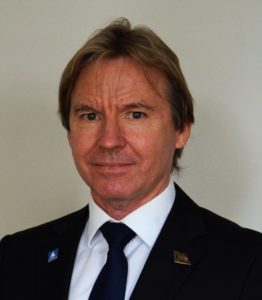
Dr. Gilbert is a graduate of the Australian Defence Force School of Languages and is currently an accredited professional Vietnamese translator. He served with the Royal Australian Navy as a cryptologic linguist participating in numerous US-Australia military operations before working in various government departments in areas of intelligence and security. Having extensive experience in national security and law enforcement operations, Dr. Gilbert obtained a master’s degree in translating and interpreting studies at the Royal Melbourne Institute of Technology (RMIT) University in Melbourne. This was closely followed by successful completion of his doctoral dissertation which focused on Australia’s language capability relied upon to combat serious and organized crime. Having published the findings of his research, Dr. Gilbert decided to study law and recently graduated from the Juris Doctor program at RMIT University in Melbourne. He has presented at universities and international conferences in Australia and the US on the subject of evidence law and forensic translation.
Dr. Gilbert holds military awards for active service during the Gulf War and special operations. He is currently the Chair of the Vietnamese panel of examiners for the Australian National Accreditation Authority for Translators and Interpreters (NAATI) and is a member of the Law Institute of Victoria, and the Submarines Association of Australia. His hobbies include physical fitness and visual arts.
Proteus: Tell our readers about yourself. Where are you from and where are you currently based?
I am from Australia, and I am currently based in Melbourne. I grew up in a small rural town and at 17 I joined the Royal Australian Navy. All I wanted to be was a cook but the navy had other plans and I was trained as a cryptologic linguist gaining formal qualifications in Vietnamese and French. I left the navy after 20 years of service, which included tours of duty on submarines involved in Cold War operations and on HMAS Brisbane during the first Gulf War. I then held a number of intelligence and security related positions in various Australian government departments prior to undertaking a lengthy period of full-time tertiary study.
Proteus: You experienced active duty during the first Gulf War in 1991. Did you use your language skills?
Yes. The Royal Australian Navy’s Clearance Diving Team worked closely with French military personnel disarming sea mines in the vicinity of Kuwait harbor. I translated communications between the Commander of the Australian Task Group and senior French military personnel in relation to operational matters.
Proteus: After leaving the navy you worked as a manager for the Australian Customs Service. Did you use your language skills there?
Yes. I was engaged to assist in negotiations with French officials in New Caledonia to expand Australia’s coastal surveillance capability to detect illegal activity threatening Australia’s security interests. The primary concern at the time was to address increases in the importation of illicit drugs and to strengthen the integrity of Australia’s borders to counter illegal immigration.
Proteus: What led you to acquiring professional accreditation as a Vietnamese translator?
Generally speaking, native English speakers have difficulty becoming proficient in the Vietnamese language due to its unique sounds and tones. I found that I was able to grasp the language quite quickly and I soon developed an interest in Vietnamese culture. I set an objective to specialize in Vietnamese translation which led to professional accreditation. It was a long, hard road but well worth it.
...I decided to study law in order to fully understand the difficulties legal practitioners face when an interpreter or translator is involved in court proceedings.
Proteus: When did you join NAJIT and what was your educational background then?
I had completed a masters of translation and interpreting in 2012 and I joined NAJIT in 2014 when I was nearing completion of my PhD. I had yet to consider undertaking the Juris Doctor program.
Proteus: You said that your experience with NAJIT inspired you to pursue the JD, for which you are extremely grateful. Please tell us how NAJIT inspired you to embark on the JD journey.
My first involvement with NAJIT was when I attended and presented at the 36th NAJIT Annual Conference held in Atlanta, Georgia in 2015. At the conference I was fortunate to meet with Professor Clifford Fishman who presented on translated transcripts used as evidence in Court. It was then that I realized that the justice system imposes many constraints in relation to evidence which conflict with the subjective nature of interpreting and translating. Also, after listening to Judge James Clayton deliver his keynote speech at the conference dinner, it was clear to me that there is still a lot of work to be done to improve the provision of interpreting and translating services in court to conduct a fair trial. It was then that I decided to study law in order to fully understand the difficulties legal practitioners face when an interpreter or translator is involved in court proceedings.
Proteus: In addition to finishing law school, what brought you to pursue a Master’s in Translation and Interpretation Studies and a PhD? Where and how did you pursue all three programs?
I decided to pursue a Masters of Translating and Interpreting Studies in 2011 and graduated in 2012. I then moved straight into a PhD and focused on evaluating Australia’s language capability that is relied upon by law enforcement and national security agencies to combat serious and organized crime including terrorism. I completed the PhD in 2015 and commenced the Juris Doctor program in early 2016. I graduated from the Juris Doctor program in February of this year. All three degrees were undertaken full-time at the Royal Melbourne Institute of Technology in Melbourne. It took seven years of full-time study to complete the three degrees. I am still unsure how I managed to get through it all. Gallons of coffee and very late nights perhaps. However, I do know that it would not have been possible but for the support and guidance I received from my family, friends and lecturers.
Proteus: How have all these accomplishments impacted your career? What opportunities have they brought you?
The knowledge I have gained from studying the three degrees has opened up a broad range of opportunities, particularly in areas of law. The JD has enabled me to further my research into problems associated with translated transcripts from electronic surveillance presented as evidence in court. I was fortunate enough to be invited to present a paper at the 6th International Conference on Evidence Law and Forensic Science held in Baltimore, Maryland last year on the topic of alleged drug-related code words and the reliability of expert opinion evidence. My studies and research enabled me to make a significant contribution to improving Australia’s language capability relied upon to combat organized crime including terrorism. This was achieved by identifying shortfalls in the training of interpreters and translators, achieving general acknowledgement that transcription skills are a hybrid of interpreting and translation skills not normally undertaken in community interpreting situations.
Proteus: During your seven years of studies, you also managed the Panel of Vietnamese Examiners for Australia’s National Accreditation Authority for Translators and Interpreters. How did you become involved in this work?
I have been on the Panel of Vietnamese Examiners since 1997 and was appointed Chair of the Panel in 2010. I manage a team of highly skilled and proficient Vietnamese interpreters and translators. Our role is to develop interpreting and translation tests for the national accreditation authority. We also mark tests completed by candidates wishing to attain professional standing. There are very few native English speakers in Australia with professional qualifications in translating and/or interpreting Vietnamese. Our role is to set and mark tests for para-professional and professional certification. It is very rewarding from a professional perspective.
Proteus: What can you tell us about the specialist certification for interpreters working in a legal setting that Australia plans to introduce this year? Have you been involved in these efforts?
The National Accreditation Authority for Translators and Interpreters undertook a rigorous study of what specialist interpreting services are required in areas of law. I was a member of a working group assigned to identify competencies required of interpreters working in a legal setting and to develop a testing format for certification as a “Certified Specialist Interpreter (Legal).” The new specialist stream aims to improve the delivery of interpreting services in a variety of legal settings, particularly in our courts.
Proteus: What percentage of candidates actually achieve professional qualifications as an interpreter/translator?
In the past ten years it would be accurate to say that less than ten percent of candidates have achieved accreditation as professional Vietnamese interpreters or translators. Australia is currently transitioning from a system of accreditation to certification of its interpreters and translators. This process involves significant changes in training and the testing format and it is anticipated that the pass rate will increase.
Proteus: Does Australia have an association of judiciary interpreters and translators?
Not yet. However, the new certification system establishes a specialist stream of legal interpreters which may, in time, result in an association being formed.
Proteus: Your doctoral dissertation identified deficiencies in Australia’s language capability relied upon by law enforcement agencies to combat serious and organized crime. What were those deficiencies?
The deficiencies I identified were mainly concerned with translated transcripts (Vietnamese to English) from telephone interception and listening devices used as evidence in drug-related trials. I found that the way alleged code-words were translated had the potential to mislead the court. This led to identifying causal factors which included inadequate training of community interpreters and deficiencies in the accreditation system.
Proteus: Interpreters often remark that court officials don’t understand the difficulties faced by court interpreters. Have you heard the same thing in Australia?
Yes. Interpreters often comment that they do not receive adequate briefings about the case prior to interpreting in court. They also become frustrated when court officials don’t adjust their speed of speech when speaking through an interpreter. This is one of the primary reasons why I decided to study law. I wanted to see the court interpreter/translator from the perspective of a lawyer.
Proteus: What revelations arising out of your studies have you had about interpreting and the law?
The language of the law is written with the purpose of specificity while also ensuring a degree of flexibility to enable the justice system to apply legal principles to a broad spectrum of cases. While there is an effort to write laws in simple English, sometimes this is difficult to achieve. A good interpreter needs to understand how to effectively and accurately negotiate the communication of legal principles and concepts. Literal renditions seldom prove to be an effective approach to communicating the intended meaning of written law.
Also, the courts have an obligation to move through cases quickly in the interests of ensuring that justice is delivered fairly and efficiently. It is usually the case that trials are relatively lengthier when a court interpreter is required. The courts will appreciate an interpreter who is punctual, well-presented, clear and articulate. However, my research revealed that court interpreters often feel they are not trusted with access to confidential information prior to the commencement of trials. The tension lies between ethical obligations lawyers have to protect their clients’ confidentiality and adequately briefing interpreters to achieve optimal interpreting performance in court. Barristers and solicitors are very careful with information relating to the way they run their cases. They are bound by ethical rules to protect information divulged to them by their client and they have an obligation to act in their client’s best interest after their paramount duty to the Court. However, there is always room for improved cooperation between lawyers and interpreters to optimize the accuracy of court interpreting which will inevitably improve the integrity of the judicial process. In an effort to address this and other issues, the Judicial Council on Cultural Diversity has published recommended standards for working with interpreters in courts and tribunals. Recognition that interpreters are officers of the court is a major achievement in this area. This emphasizes the paramount duties an interpreter owes to the Court to interpret accuracy and impartiality overriding any duty the interpreter may have to any party to the proceedings.
Proteus: In which area of law do you intend to practice?
A barrister recently advised me to choose an area of law where I feel most comfortable. As I have extensive experience in national security and law enforcement, I see myself working in the area of criminal prosecution or international law.
Proteus: What area of law do you consider a court interpreter should be most familiar with?
An understanding of criminal and civil procedure is very important. Interpreters need to understand the meanings of key legal concepts that are frequently referred to in court. For example, in US courts, I would imagine that court interpreters would need to be familiar with Federal Rules of Evidence 701 and 702 and understand why those rules are important in relation to expert witness testimony, especially for those interpreters or translators who may be called as expert witnesses themselves. The rules often require knowledge of how and when they are applied in order to bring context to their application. However, this may be considered advanced knowledge that court interpreters might aspire to obtaining.
Proteus: Your story is certainly inspiring. What can you tell our readers regarding a career in legal translation and interpretation? What challenges do you see coming our way?
There are a number of interesting areas of law where interpreters and translators can refine their skills. Police interpreting is one such area and there will always be a demand for it. Forensic interviewing techniques are constantly being refined and updated to optimize the effectiveness of witness responses. This means that interpreters need to be able to mirror the questioning format as closely as possible and to interpret with minimal interruption to ensure that investigative interviewing techniques achieve maximum effect.
In relation to future challenges, we are seeing an increase in the number of police interviews using telephone interpreter services and court trials using videoconferencing. These forms of disruptive technology require interpreters to adapt quickly to technological change and to find ways of mitigating limitations imposed by the method of communication. For example, a police interview conducted through an interpreter over the phone will deny the interpreter information derived from body language which may affect the flow of interpreting. Also, in phone interviews, the interpreter has a reduced ability to control the flow of communication between participants in the interview. I see significant challenges also coming from those advances in the development of automated interpreting/translating technology. Google translate, for example, has come a long way from where it began in 2006. Having said that, I think most will agree that there is a long way to go before interpreters and translators will be replaced by machines, if in fact this ever occurs. Perhaps the intuitive aspect of human language is a factor that machines will never be able to replicate.
Thank you very much for sharing your experience with our readers.
The views and opinions expressed are those of the author and do not necessarily reflect the official position of NAJIT.
NAJIT News
Letter from the Chair
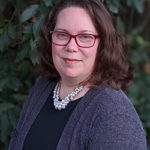
By Aimee Benavides
Dear colleagues,
In my first letter as Chair, I would like to thank all of our members for their care and consideration in the recent elections. I am very grateful and humbled to have the opportunity to serve with my fellow board members on behalf of our esteemed colleagues and dear friends. I believe I speak on behalf of the entire board when I express that we value your trust and are committed to leaving both our profession and our association stronger and more empowered than we have found it.
I have been carefully considering what it means to be a professional association. It is one thing to simply repeat what our stated purpose is; they are found in the bylaws and readily accessible. Our tagline is to empower interpreters and translators worldwide. As judiciary interpreters and translators, we have a unique niche in the legal field; yet there is more we can be and more we can do. What I want to do is dig even deeper. What do we envision for ourselves as a profession and how can our association achieve it?
For far too long, interpreters and translators have worked in a reactionary mode, dealing with policies implemented by outsiders. Strides have been made, but too many decisions are made at conference tables and in closed-door meetings where we have not been invited or simply haven’t insisted on being present. Language access coordinators discuss language access without inquiring of those who are ”in the trenches” providing said access. Language service providers are gearing up to advocate and lobby regarding employee reclassification issues all without so much as an inquiry of our professional association. We are in a unique position to share the practitioner’s point of view on language access. We can advise language service providers on best practices and the status interpreters choose to work under based on research, training, and experience. We have unique insights that can improve communication in law enforcement settings. The best practices that we publish are used to support our colleagues in their pursuit of better working conditions. Because we are a national association, we can rise above the competitive nature that may be found regionally among independent professionals to find ways to raise the profile of the entire profession. As the saying goes, “A rising tide lifts all boats’.”
My goals during this year as Chair include helping to propel NAJIT into a leadership position and increase name recognition with key organizations, agencies, governmental offices and professional associations that exert influence over us. We are well known for the high caliber of continuing education and excellent conferences. We can take all of those skills into new arenas. To take our message and adapt it to those audiences – whether they be language access coordinators or members of the Bench and Bar – we need the help of the entire association. Instead of saying, ‘I think NAJIT should do this’ let’s change the dynamic and say, ‘I know I can help NAJIT do this’. To reach new audiences and take back the leadership role within our own profession, I issue the following challenge:
1. Identify the associations in your region that exist and when they meet. We can only be present and represent our profession if we know about these events. These associations can be Court Reporter Associations, District Attorney Associations, Defense Attorney Conferences, Language Access Coordinators, Law Enforcement Workshops, Judges’ College and so on.
2. Identify the biggest challenges in your region – and let us know what they are. If you would benefit from a position paper, help us identify the problem and help us draft the solution. NAJIT has the respect of many court administrations and when a best practice is set forth by us, it has standing. You don’t have to be part of a committee to send recommendations or to send us a draft you’re working on.
3. Ask yourself, is my profession worth promoting? Ask your colleagues, is our profession worthy of our time and effort? If your answer is yes, then one way to promote it is to support the volunteer efforts of NAJIT. Encourage all of your court colleagues to join NAJIT or to renew their membership. There are many member benefits, and if that weren’t enough – just think of how much further we can go with the support of our colleagues. Having exhibit tables or NAJIT sponsored speakers at important events allows us to have face to face interactions with decision makers and agencies that might otherwise prefer the status quo or simply try to do things their way rather than the right way. Your membership allows NAJIT to advocate for you and for our profession-for both interpreters and translators, employees and freelancers alike.
4. Let go of negativity. Change can happen and we can be the force that effectuates it.
5. Ask yourself – ‘What skills do I have that can help my profession and my colleagues?’ Even the ability to find good content to share on social media is a skill that can be used to further our profession. The ability to network and listen to other people. Do you have public speaking skills? Do you feel comfortable being on camera? Even offering to provide your tips to new interpreters for use on NAJIT’s YouTube channel can reap long-term benefits. Are you great at seeing talent in others? Don’t keep it to yourself!
Many hands make light work.
Are you up to the challenge? If you care, then you have what it takes!
Over the next few months, I look forward to sharing the results of all of the hard work the board and committee volunteers are putting into the various projects that are just beginning. My hope is that you will join us and see how rewarding it is to bring your talents and passions to a project that has the potential to help not only yourselves, your colleagues, but also those who will follow in our footsteps.
Your fellow volunteer,
Aimee Benavides
Chair, NAJIT
2018 Conference Roundup
This past June found me in San Francisco on the weekend of June 9th. I was lucky enough to be there, along with 356 other language professionals, to attend NAJIT’s 39th annual conference. The weather was brilliant and the city beckoned. But first, there was networking to do!
One hundred and eighty people attended Friday’s 12 different pre-conference workshops, which offered advancement in consecutive note-taking, exam preparation and more. NAJIT recognizes the importance of building bridges across our different fields, and on Friday there was also a special crossover session offered for medical interpreters hoping to transition into the judiciary.
In the evening we had our first ever meet and greet, offering six stations with information for newbies, translators, interpreters, judiciary crossover, the conference app, and LOTS (Languages Other Than Spanish) professionals.
On Saturday, the conference really got underway. With a total of 52 speakers and 316 participants hailing from 38 states and 6 different countries, the meeting rooms were bustling with activity. This was the perfect opportunity for professionals from all over to come together to learn about advances in the field and earn continuing education hours. Twenty-eight states and organizations, including the American Translators Association (ATA), the Certification Commission for Healthcare Interpreters (CCHI) and International Medical Interpreters Association (IMIA), had approved CEUs. This year the board made a strong effort to promote workshops for LOTS interpreters, and this was rewarded by several different sessions, including specific workshops for Arabic and French interpreters.
There were plenty of moments to network with other interpreters and translators, as well as opportunities to visit vendors and sponsors during coffee breaks and at the annual luncheon and the Saturday evening reception.
Our keynote speaker at the luncheon, Mr. Jeff Adachi, who is the elected Public Defender of the City of San Francisco, gave an address that was very well received. He spoke about the importance of language access in the fair dispensation of justice, his high regard for the work that interpreters do and the way in which we serve a vital function in the judiciary. Mr. Adachi also mentioned his commitment to providing attorneys for immigration court. He discussed his surprise at the lack of legal representation and lack of interpretation during parts of the proceedings. SOSI’s representative met with Mr. Adachi afterward and we are hopeful to have in Mr. Adachi an ally who will also make language access a priority in immigration court as well as it is in criminal court. Mr. Adachi underscored the importance of having qualified interpreters as they can affect the outcome of a case, for better or for worse.
Some of us (yours truly) retired to our rooms after a packed day at the conference, but others put on their dancing shoes and headed out for a night of salsa dancing in San Francisco. Then it was up bright and early the next morning for our annual town hall meeting, and some brave souls even made it to 6am Zumba!
We are still a new profession, but this conference was a demonstration of our commitment to the field, and every year finds us bigger and stronger than ever. There is much work to be done before there is uniformity across the field and consistent, professional support, and it is by participating in conferences like these that we are able to come together as a profession, improve our knowledge and make our voices heard. So, no more excuses…See you next year in Nashville for our 40th Annual Conference!
HINT: Register as soon as possible for next year’s conference and workshops to avoid being left out. Registration will open in January 2019. And here’s a heads-up – we’re going to Nashville, TN, May 17-19, 2019 at the Gaylord Opryland Resort & Convention Center. We have an excellent rate of $185 a night, so start saving your pennies.
There were 11 exhibitors who offered information about their organizations and products:
Judicial Council of California
Capelle Spears
Interpreter Intelligence
MVM
National Center for Interpretation
The Confident Interpreter
American Translators Association
SOSi
Interpreter Training Group
Paras and Associates
CWA
The Scholars
Congratulations to a wonderful crop of Scholars this year, whom we hope to cultivate and nurture to be leaders in the future of our profession. We look forward to reading their impressions of their first NAJIT conference in the next issue of Proteus. They are:
Thank you to all the official and unofficial mentors who took time to speak with and offer them guidance. The mentors are:
Heidi Cazes
Mylene Green
Michael Kagan
Melissa Wallace, PhD
The Board
NAJIT’s newly comprised Board of Directors is as follows:
[Athena Matilsky fell in love with Spanish the year she turned 16. She chose it as her major at Rutgers University and selected a focus in translation and interpreting. After graduation, she taught elementary school in Honduras and then returned home to begin freelancing as a medical and court interpreter. She has since achieved certifications as a Healthcare Interpreter and a Federal Court Interpreter. She was the recent editor-in-chief of Proteus. Currently, she works as a freelance interpreter/translator and trains candidates privately for the state and federal interpreting exams. When she is not writing or interpreting, you may find her practicing acroyoga or studying French. Website: https://athenaskyinterpreting.wordpress.com/]
2018 NAJIT Scholar Testimonials
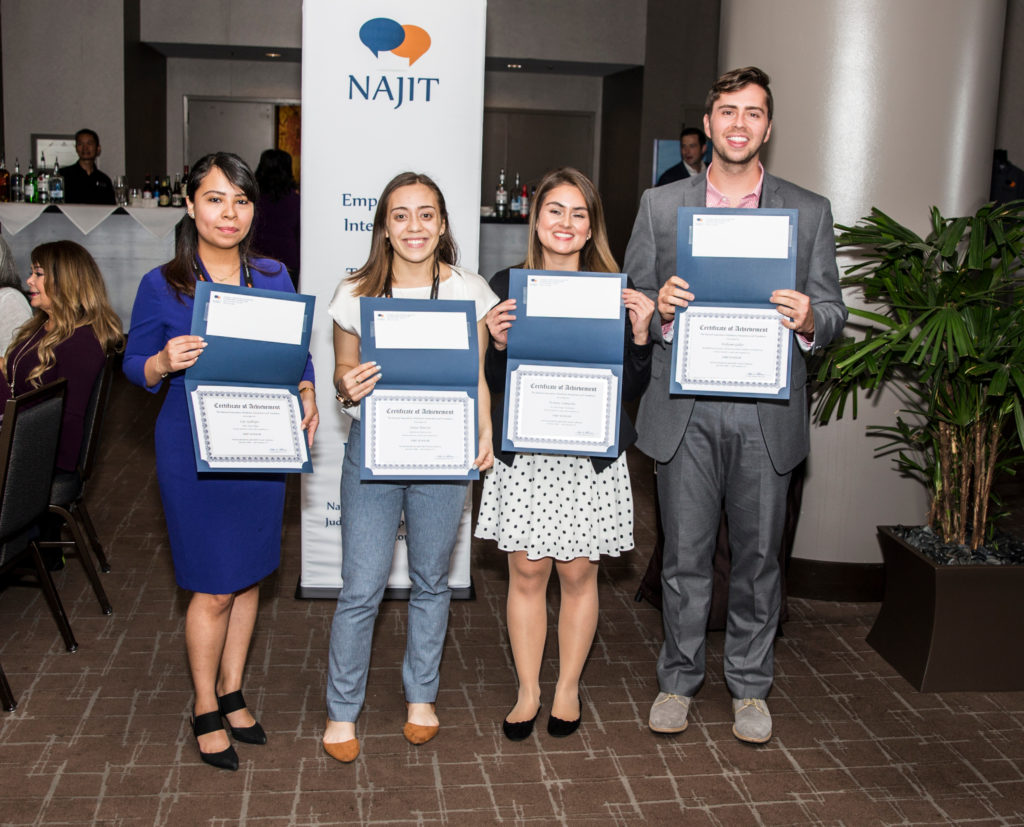
2018 NAJIT Scholars
Ivonne Camacho – UC San Diego Extension
Luz Gallegos – John Jay College of Criminal Justice
William Giller – Middlebury Institute of International Studies at Monterey
Sonia Rincón – American University
Ivonne Camacho
My name is Ivonne Camacho and live in Lexington, KY. I am a student in the online Professional Certificate in Translation and Interpretation at University of California-San Diego Extension (UCSD). I applied for the NAJIT Scholars Program because my interest and research in translation and interpretation prompted me to learn about the main professional associations, and I’ve been subscribed to NAJIT’s Observer as a valuable source of information. When I received the information about the Scholars program, I applied because I am currently utilizing all of my disposable resources to continue my education. I study online, and even though the knowledge and experience I have gained from my instructors has been invaluable, I wanted to have an opportunity to meet colleagues face to face.
When I received the news I was selected, I was overjoyed! I had wanted to attend one of the major conferences for a long time but couldn’t due to financial constraints. My experience during the conference was outstanding. I learnt so much from every single session I attended. There was something for everyone and I met so many nice people, and I achieved my goal, which was to meet experienced professionals and receive the most up-to-date developments and training in the profession.
Two people stood out in my mind from all the sessions I attended. I really enjoyed the sessions with Karen Borgenheimer on voice projection and quality, because I feel it is a unique subject that is not covered in most interpreting programs, and second, attending Gloria M. Rivera’s session on analyzing a toxicology report, mainly because I have followed her in social media for a long time and in a way, she was my inspiration to join the program at UCSD. Attending the conference gave me a lot of confidence in myself and motivation to keep going. I have a lot of work to do, but thanks to meeting so many accomplished professionals I see what is possible in this wonderful profession. I want to thank the Board once again for this wonderful opportunity and I am already looking forward to attending the NAJIT Conference next year!
Luz Gallegos
My professors for Spanish translation and interpretation at John Jay College are always looking to provide us with as many opportunities as possible to help us grow in our future profession. That’s why when Professor Aida Martinez emailed us about the NAJIT Scholars program I went to the website to find out more. What caught my attention the most was the fact that this was both a networking and learning experience. Not only was I going to be able to learn new things beyond the classroom, I was also going to have the opportunity to meet professionals from all over who have been doing this for years, and for a college student who was just getting started, this was perfect. I have to admit that when I saw that this was only given to five students in the country, I became a bit disappointed, but still I decided to go for it.
I was in my translation I class when I received an email saying that I was chosen as a scholar. I could barely believe it. The amount of excitement I felt was unbelievable, so much that I shared the news immediately with all my classmates and my professors. I even stopped in between classes to call my mother.
My experience with the conference was amazing. I had the chance to meet and interact with people who have been interpreting for years. It was exciting to know their stories and how they got to where they are now. Hearing about each of them made me even more inspired than what I already was, but it also made me realize something very important: being knowledgeable about terminology is a must, but being confident and taking risks is an essential part of growing in the world of interpretation. Each of them helped me discover something new about myself, but Mr. David Gilbert’s helpful words have helped me take chances and keep pushing for what I want.
As for the classes, I absolutely loved the ones I chose. It was amazing to see how much knowledge interpreters have, not just about interpreting but also about many other topics. Personally, I was extremely excited to see classes in some of the topics that really interest me, like The Anatomy of a Toxicology Report and Forensic Drug Analysis Vocabulary. What made it even better was the fact that those who gave the workshops were not just teaching or talking about something, they were demonstrating it with such interest and enthusiasm. I will never forget Mrs. Genevieve Navar Franklin and her captivating story about the time she had to interpret for a capital murder case. I remember her showing us a video of when she was narrating that same story to a different audience. The way she was narrating the events and the lessons she learned were not only interesting to hear, but also brought me and a couple of others to tears. “I am their voice” has stuck to me ever since.
I got so much out of attending this conference. I was able to meet lifelong friends, such as other professionals as well as the other scholars. I learned a little bit of everything as well as improved simultaneous interpreting skills, which I have been able to use in my student interpreter internship. However, the most important thing that I came out with was a passion for interpreting and translating. I went from“this might be something I chose to do” to “I know this is what I want to do.”
William Giller
My name is William Giller and though I’m based in San Francisco, I’m currently interning in Manhattan at the United Nations in the translation and editing department. I came into the NAJIT conference with an open mind and I was blown away by how warm and welcoming everybody was that I met. The minute someone learned I was one of that year’s scholars, I was greeted with a congratulations and sincere interest in where I studied and what I was interested in professionally. I applied to the NAJIT Scholars program not only because I’m interested in legal interpretation, but also because I was interested in seeing what a smaller conference was like. Unlike other professional association meetings I have participated in, NAJIT was much more congenial; everybody was happy to see each other, excited to sit in on the classes and network. I came away from the experience with many new contacts, all very willing to pass on information and helpful hints and tips of the trade.
Sonia Rincón
My name is Sonia Rincón, and I am a graduate of American University in the Washington D.C. area. I applied for the 2018 NAJIT Scholar Award program hoping to find a stepping stone from university into the professional field of interpretation and translation. What I found through NAJIT and my participation at the annual conference, however, was much more profound. Being able to become part of a professional association gave me the opportunity to not only broaden my own knowledge and further my profession, but moreover gave me the opportunity to enhance my network through developing lasting professional and personal relationships. Therefore, one of the most invaluable things that I was fortunate enough to experience at the NAJIT Conference was the expansive community of mentors and professionals in the field, all willing to help me now (and in the future) as I pursue translation and interpretation as a career. Therefore, what I found at the NAJIT conference was an extraordinary community of individuals who will forever be part of my life and professional development as I continue to grow, learn and develop in the field.
Call for Volunteers

Regular Columns
For Better or Verse – Driven

By Hal Sillers
Driven
Since we drive, drove and have driven
To reach the places that we live in,
Logic says we must arrive, arrove and have arriven.
And as we strive, strove and have striven,
To organize the world God has given,
We’re obliged to thrive, to throve and to have thriven.
Though dive and dove should give us diven,
And weave ‘n wove ought be wiven,
There’s rive, not rove, yet clearly we can still say riven.
Cleave can be clove, but for naught can it be cliven,
And two opposites are known, by h’ven.
So if you don’t get English, you are certainly forgiven.
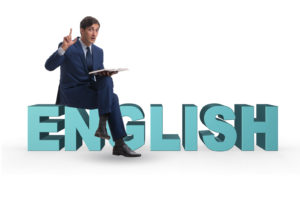
[Hal Sillers is a MN state and federally certified interpreter of Spanish and frequent contributor to this column. Hal is also the Staff Interpreter for the MN 8th Judicial District.]



